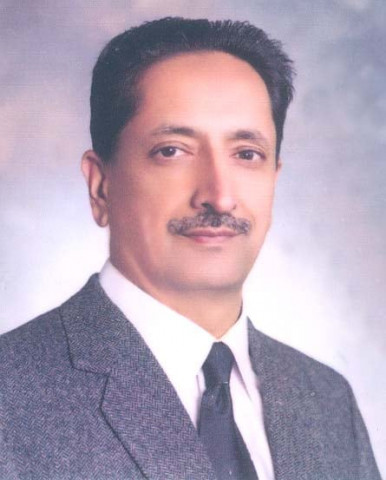Unclaimed wages are assets, maintains Justice Ejaz
Top court suggests Sharifs' lawyers focus on convincing smaller bench which wrote disqualification verdict

Justice Ejaz Afzal Khan. PHOTO COURTESY: PESHAWAR HIGH COURT WEBSITE
Former premier Sharif was disqualified under Article 62(1)(f) for failing to declare unclaimed wages earned as an executive of a Dubai-based company owned by his son in the assets statement he filed alongside his nomination papers for NA-120 in the 2013 general elections.
Panamagate saga ends: Prime Minister sent packing
A five-judge bench, headed by Justice Asif Saeed Khosa, on Wednesday resumed hearings of Nawaz Sharif and his children’s review petitions against its July 28 judgment.
Legal experts say it would be interesting to see whether the same bench will lay down the law on the disqualification of any parliamentarian under Article 62(1)(f) of the Constitution and whether disqualification under this article will be lifelong or for a specific period.
During the hearing on Wednesday, Justice Ejaz Afzal Khan said that if the implications of disqualification under the same article are far-reaching, they would like to hear that perspective. He also questioned whether the court held such a disqualification to be life-long.
Another judge, Justice Azmat Saeed Sheikh, however, said that there are some SC verdicts wherein it was declared that disqualification under Article 62(1)(f) is lifelong.
During the hearing, Khawaja Haris, counsel for Nawaz Sharif, gave arguments on three points. Firstly, he objected to the formation of different benches at various stages of the Panama Papers case. Secondly, he raised questions over the disqualification of Nawaz Sharif under Article 62(1)(f) of the Constitution, positing that the SC did not give a proper hearing to the deposed PM before disqualifying him on the issue of employment with the UAE-based firm Capital FZE.
Damning indictment: JIT suggests filing NAB reference against Sharif family
Lastly, the counsel also objected to the nomination of a monitoring judge to supervise the investigation, prosecution, and trial before an accountability court. “The SC itself has become complainant, prosecutor, and judge in this matter,” he added.
However, Justice Ejaz Afzal Khan told the counsel that he could cross-examine every witness, and that the conclusion of the accountability court’s judge, without being influenced by the apex court’s observations in the Panama Papers case, would be subject to the scrutiny of witnesses as well, adding that he could even cross-examine members of the Joint Investigation Team (JIT).
Regarding the issue of Nawaz Sharif’s disqualification, Justice Ejaz Afzal Khan observed that there was a written agreement entitling Nawaz Sharif to salary.
Another judge, Justice Ijazul Ahsan, said that if he did not withdraw the salary, why was his iqama (work permit) not suspended. He further observed that the judges of the apex court showed care while writing the July 28 judgment so that the trial could not be influenced.
“It was just the tip of the iceberg and if the petitioners are willing to compel the court to uncover the whole of it, they should not complain about the consequences later,” he said.
The judge wondered if a poor person stole 10,000 UAE dirhams, he would be sent to prison, but when a billionaire did the same, he would not face similar consequences.
Panamagate: Some case record tampered with, says JIT
Haris contended that the SC could not disqualify Nawaz Sharif under Article 62(1)(f) of the Constitution on the basis of concealment of assets as it could examine the matter under section 76-A of the Representation of People Act 1976, wherein the court could only de-seat a parliamentarian. He questioned why the SC picked one dictionary by defining the meaning of ‘asset’, adding that the court could not make a declaration regarding anyone’s honesty under Article 62(1)(f) of the Constitution merely on the basis of an omission.
Upon this, Justice Azmat Saeed Sheikh said that the court was not hearing the matter under appellant jurisdiction but also that it adjudicated the case under the jurisdiction of the official warrant available to superior courts under Article 184(3) and 199 of the Constitution. He also said that though the petitioners did not raise the issue of Capital FZE, Justice Ijazul Ahsan had raised it in his additional note.
Justice Ijazul Ahsan in his April 20 verdict said that there is yet another company under the name and style of Capital FZE Dubai, presumably registered under the law of UAE. “Funds also appear to have been routed through the said company from time to time on behalf of [Hassan Nawaz]. The real owner of the said company is still unclear from the record, which needs to be explained.”
With govt fixated on Panamagate, state business suffers
Earlier, Justice Asif Saeed Khosa, who is heading the larger bench, observed that he was one of the two members that disagreed with the formation of the six-member probe panel by majority judges in the court’s April 20 verdict. “The conclusion of the five judges on Sharif’s disqualification and supervision of a subsequent trial is the same, but their reasons are different,” he remarked.
Referring to several earlier verdicts of the top court, Justice Asif Saeed Khosa said, “Orders of the court are always signed by all judges, even those who hold the minority view in the verdict.” He wondered what the problem was if all the judges signed the final order. He asked the counsel if he was telling the authoring judges what was in their mind when they wrote the judgment. He also suggested that instead of raising these questions before the five-member bench, he should convince the three-member bench which disqualified Nawaz Sharif on the basis of the unclaimed salary from Capital FZE.
The hearing was adjourned till Thursday (today).



1724319076-0/Untitled-design-(5)1724319076-0-208x130.webp)















COMMENTS
Comments are moderated and generally will be posted if they are on-topic and not abusive.
For more information, please see our Comments FAQ